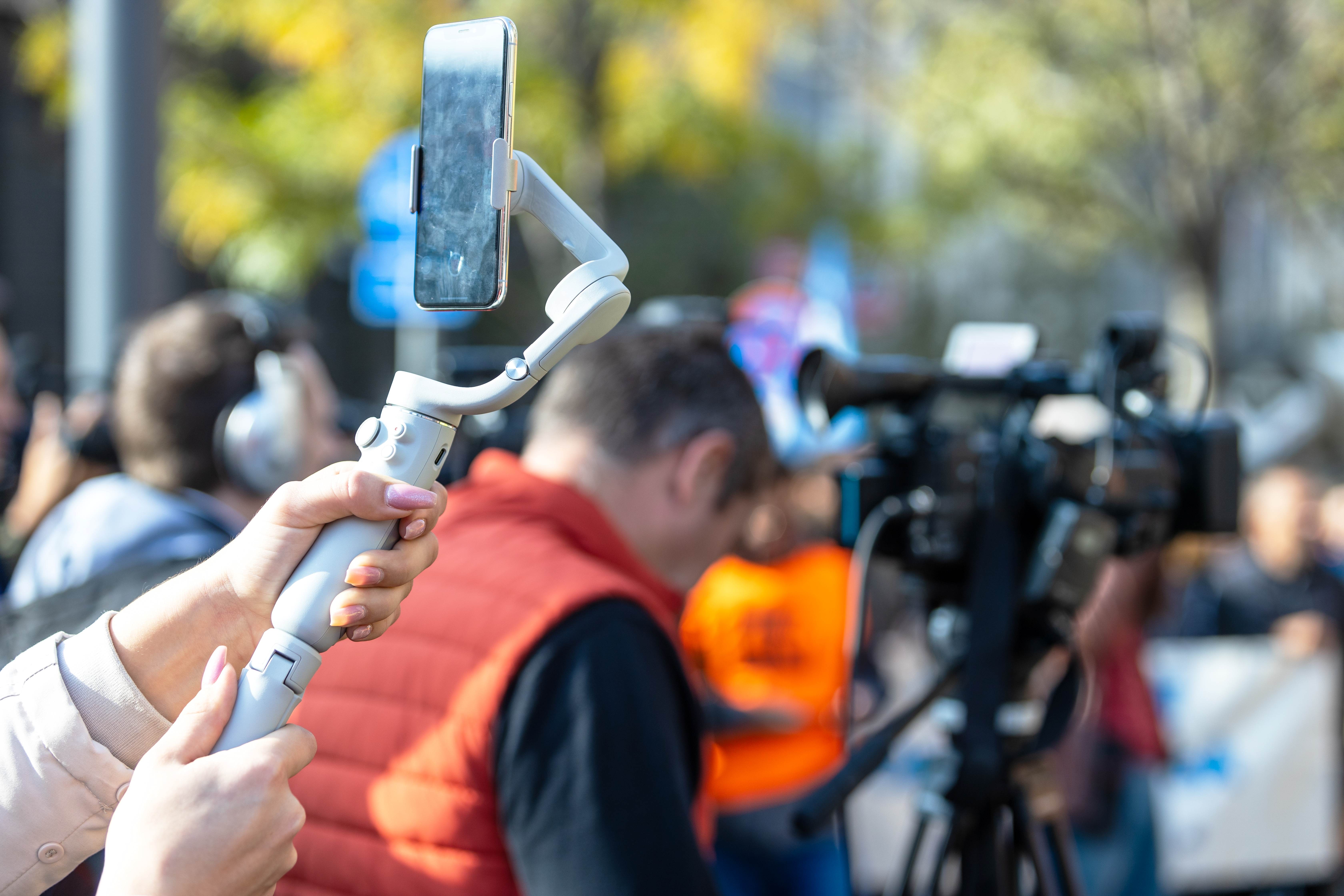في سوريا يجد الصحفيون المستقلون أنفسهم مجرّدين من أيّ ضمانات مهنية تحمي حقوقهم، أو توفر لهم الاستقرار في مواجهة تهديدات أمنية وصعوبات مالية وضغوط سياسية تقيّد تجربتهم الصحفية، كما تسلب بعض المؤسسات الإعلامية الصحفيين المستقلين حقوقهم القانونية مثل عدم إدراج أسماء المراسلين أو المصورين على المواد الصحفية وبيع بعض المواد الإعلامية أو إعادة استخدامها دون العودة إلى منتجها الأصلي؛ وهذا يقوض شعور الصحفيين بالأمان المهني.
يقول محمد العلي - وهو صحفي مستقل من سوريا -: "العمل الصحفي يصبح أكثر صعوبة مع غياب العقود الرسمية وحقوق الصحفيين، وفي كثير من الأحيان نجد أنفسنا مضطرين للعمل دون أي ضمانات، ومع ذلك نواصل رسالتنا رغم كل التحديات".
يواجه الصحفيون تحديًا آخر يتمثل في تغيير متطلبات العمل الصحفي وغياب برامج التدريب؛ فعلى سبيل المثال: أصبحت مهارات التحقق من الأخبار ومكافحة خطاب الكراهية والتضليل الإعلامي ضرورة لمواكبة هذا العصر، ولعل معهد الجزيرة للإعلام والمعهد العربي من بين الجهات القليلة التي توفر تدريبًا للإعلاميين السوريين، لكن معظم هذه الدورات تُعقد في مراكز المدن الكبرى، حيث يصعب الوصول إليها بسبب العوائق المادية المتمثّلة في تكاليف التنقل المرتفعة، ويرى العلي أنّ "معظم الفرص غير متاحة للجميع؛ حيث تتركز في أماكن بعيدة عن الصحفيين المستقلين الذين يعملون في الميدان".
الإعلام السوري بين الاستقلالية والقيود
رغم التغيرات التي تشهدها سوريا خلال الفترة الأخيرة، تقف عقبات كثيرة في وجه بناء منظومة إعلامية حرة ومستقلة؛ إذ يعمل الصحفيون السوريون في بيئة غير مستقرة تتشابك فيها التحديات الأمنية مع الضغوط السياسية، وهذا يجعل الاستقلالية الصحفية أمرًا صعب التحقيق، لكنّ الثورة الرقمية تفتح آفاقًا جديدة تتيح للصحفيين نشر الأخبار والتواصل مع الجمهور بشكل أسرع، رغم استمرار المخاطر التي تحيط بعملهم.
في ظل هذه الظروف، يلجأ الصحفيون إلى أدوات جديدة لمحاولة تجاوز هذه التحديات، وتوفر الثورة الرقمية لهم مساحة أكثر استقلالية لنقل الأخبار دون الحاجة إلى المرور عبر المؤسسات التقليدية.
تعتقد منيرة بالوش - صحفية في موقع سوريا 24 - أنّ "التكنولوجيا غيّرت طريقة عملنا كصحفيين، أصبح بإمكاننا نشر الأخبار بسرعة، والتواصل المباشر مع الجمهور دون الخضوع للرقابة التقليدية، كما أن التوثيق الفوري للأحداث ساعد في إيصال الحقيقة رغم كل محاولات التعتيم".
تشكل وسائل التواصل الاجتماعي جزءًا أساسيًا من عمل الصحفيين المستقلين السوريين؛ حيث يعتمدون على منصات مثل فيسبوك وإكس وتيليجرام ليس لنشر الأخبار فقط، بل أيضا لمتابعة الأحداث والبحث عن مصادر جديدة.
هكذا تشكل وسائل التواصل الاجتماعي جزءًا أساسيًا من عمل الصحفيين المستقلين السوريين؛ حيث يعتمدون على منصات مثل فيسبوك وإكس وتيليجرام ليس لنشر الأخبار فقط، بل أيضا لمتابعة الأحداث والبحث عن مصادر جديدة؛ إذ تمنح هذه المنصات مساحة أوسع للتعبير، إلا أنها تجعل الصحفيين عرضة لمخاطر الاختراقات الأمنية، فضلًا عن ضعف البنية التحتية للإنترنت في بعض المناطق، وارتفاع تكاليف الأجهزة والتدريبات اللازمة لمواكبة التطورات الرقمية.
يحاول الصحفيون المستقلون تجاوز هذه التحديات من خلال بناء هويات رقمية قوية، والعمل على إنتاج محتوى موثوق ومهني بعيدًا عن الضغوط السياسية، والتفاعل المستمر مع الجمهور واستخدام تقنيات البث المباشر مما يساعد في تعزيز المصداقية والوصول إلى أكبر شريحة ممكنة. ووفق منيرة فإنه ""رغم المصاعب، يظل الأمل قائما لتطوير إعلام قادر على تقديم الحقيقة باستقلالية، والاستفادة من التكنولوجيا لبناء مستقبل أكثر شفافية ومهنية".
يحاول الصحفيون المستقلون تجاوز التحديات من خلال بناء هويات رقمية قوية، والعمل على إنتاج محتوى موثوق ومهني بعيدًا عن الضغوط السياسية، والتفاعل المستمر مع الجمهور واستخدام تقنيات البث المباشر مما يساعد في تعزيز المصداقية والوصول إلى أكبر شريحة ممكنة.
ترى الصحفية المستقلة سلوى عبد الرحمن، التي تعمل في إدلب، أن الإعلام المحلي يواجه تحديات كبيرة، لكنه في الوقت ذاته يملك القدرة على أن يكون أداة تغيير حقيقية قائلة: "الإعلام المستقل قادر على توثيق معاناة الناس، ونقل أصواتهم، وإبراز مشكلاتهم. وبعيدًا عن الاستقطاب السياسي، فنحن الصحفيين لا نملك القوة لحل الأزمات، لكننا نستطيع الإضاءة عليها، وهذا بحد ذاته خطوة نحو الحل".
تبرز أهمية الصحافة المستقلة، حسب عبد الرحمن، خاصة أثناء المرحلة الانتقالية في " إعادة الثقة بين السوريين، وإيصال أصوات الضحايا من جميع الأطراف، وتقديم خطاب يركز على القيم المشتركة، لا على تعميق الخلافات؛ فالإعلام يمكنه أن يكون أداة للإصلاح إذا التزم بالموضوعية ونقل الحقيقة بعدالة".
إن بناء سوريا جديدة لا يمكن أن يتم دون صحافة حرة مستقلة، تنقل الواقع كما هو، وتسهم في فتح مساحات للحوار بين الأطراف. فإذا كانت الحرب قد فرّقت السوريين، فإن الإعلام الصادق قد يكون أحد العوامل التي تعيدهم إلى طاولة الحوار، بعيدًا عن لغة السلاح والخطاب التحريضي.
فرص واعدة
يواجه الإعلام السوري تحديات كبيرة منذ تحرير سوريا من قبضة النظام السابق، حيث برزت مشكلات أثّرت على جودة الأخبار وانتشار المعلومات الزائفة، وضعف التمثيل المحلي للمناطق، وانعدام الوصول الإعلامي إليها، الأمر الذي أدى إلى غياب الدقة والمصداقية نتيجة تراكمات الإعلام الحكومي السابق الذي كان يعاني الفساد والانحياز.
في سنوات الثورة، ساد الصراع بين الإعلامين الحكومي والمستقل، فالأول كان يعتمد على الرقابة الصارمة وتمجيد السلطة، بينما الثاني لا يزال حديثا في المناطق المحررة التي لم تعهد إعلامًا مستقلًا من قبل مثل "تلفزيون سوريا" و"عنب بلدي".
ويمكن القول، بناء على ذلك، أن ممارسة الصحافة المستقلة ممارسة حديثة في سوريا انتعشت أكثر خلال سنوات الثورة، وتحتاج اليوم إلى تأسيس حقيقي.
يعتقد أكرم الأحمد، مدير المركز الصحفي السوري: أن "الإعلام المستقل بحاجة إلى تعزيز مهارات الصحفيين من خلال برامج تدريبية مكثفة؛ إذ هناك فجوة واضحة في الخبرات، خاصة في مجال التصوير الاحترافي، وتقنيات الصحافة الرقمية، وأساليب التحقق من المعلومات، ومن الضروري توفير ورش عمل مستمرة بالتعاون مع المؤسسات الإعلامية العالمية؛ لضمان قدرة الصحفيين السوريين على المنافسة في المشهد الإعلامي الدولي".
أما من الناحية القانونية فلا تزال البيئة التنظيمية ضعيفة، وهو ما يفسح مجالًا لتصاعد خطاب الكراهية الذي قد يؤثر على الاستقرار الأمني والاجتماعي في البلاد. مع ذلك، تستمر المبادرات التي تهدف إلى تحسين البيئة الإعلامية، مثل هيئات مستقلة لتدريب الصحفيين، وتشجيع الصحافة الاستقصائية والمهنية.
من الناحية القانونية لا تزال البيئة التنظيمية ضعيفة، وهو ما يفسح مجالًا لتصاعد خطاب الكراهية الذي قد يؤثر على الاستقرار الأمني والاجتماعي في البلاد.
وإذا تمكن الإعلام السوري - كما يرى الأحمد - من تعزيز قدراته في مجال التدريب والتطوير، وتحسين مهارات الصحفيين في مجالات التحقيقات الصحفية والأمن الرقمي فسيكون بمقدوره أن يحقق نقلة نوعية في مجاله، و"الحاجة ملحة لمزيد من الدعم الدولي والإقليمي للمؤسسات الإعلامية السورية المستقلة، سواء عبر التمويل أو التدريب أو توفير وسائل الإنتاج المتطورة".
تبقى الصحافة السورية المستقلة صمام الأمان الذي يحفظ ذاكرة الشعب السوري، ويعزز العدالة والمصالحة الوطنية، و يعيد بناء وطن كان ولا يزال يتطلع إلى الحرية والسلام.








































